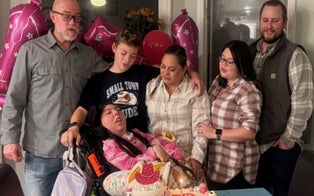The recommendations include no water beds and no couches.
As a 7-week-old baby in Milwaukee, Wis., becomes the city’s first infant death of 2018, authorities believe co-sleeping may have been a factor.
The baby was found dead in her Milwaukee home Tuesday. Last year, 25 of 45 infant deaths in the Milwaukee County Medical Examiner’s Office were reportedly related to an unsafe sleep environment, WISN-TV reported.
Those environments included co-sleeping, sleeping in an adult bed or sleeping with pillows and toys, according to the medical examiner’s office.
“Co-sleeping” or “bed-sharing” between a mother and her baby isn’t inherently dangerous if mothers take proper precautions, according to Dr. James McKenna, the director of the Mother-Baby Sleep Laboratory at the University of Notre Dame.
“There is a double standard that is used in Milwaukee and elsewhere, that there is no way a baby can sleep next to its mother on the same surface safely,” Dr. McKenna told InsideEdition.com. “If this were true, you and I would not be here today, because biologically speaking up until very recent times, the only way babies lived was lying next to their mother’s bodies and breastfeeding. That’s the human universal.”
Dr. McKenna did, however, say that there are rules that mothers should follow to make sure they are co-sleeping in safe circumstances, including not sleeping in a bed with other children, and never sleeping on couches or water beds with one’s baby.
“If mothers were smoking during their pregnancy, that damages the breathing arousal mechanisms of babies and you probably wouldn’t want to bed-share then,” Dr. McKenna said. “Don’t have any other children in your bed. Have a stiff mattress. Keep your baby away from pillows and heavy blankets.”
McKenna also said babies should wear light sleeping clothes to bed. He added that mothers should not use any drugs or alcohol before sleeping or lying down with their babies.
“Alcohol or pills of any kind would desensitize a mother’s natural ability to arouse, to monitor the safety of her baby,” Dr. McKenna added. “Mothers have built-in capacities to respond and monitor the condition of their babies during their sleep. They sleep very differently when their babies are in bed."
Other doctors have argued that the practice is entirely unsafe and the safest place for a baby to be is alone in their crib.
“Putting the baby’s crib or bassinet in your room means your baby is right there with you — steps away,” Rallie McAllister, MD, MPH, told TheBump.com. “But she’s in her crib, which is the safest place for a baby to sleep. Your baby’s crib should be her safe haven.”
A Pediatrics (Official Journal of the American Academy of Pediatrics) study published in 2014 found that 74 percent of deaths in babies younger than 4 months old were due to a "bed-sharing situation."
The study analyzed data of more than 8,000 infant deaths from 24 states that occurred between 2004 and 2012.
McKenna says, however, that many studies do not take into account problems such as premature birth or the baby's environment.
"In modern settings [it's] a little bit more complicated," Dr. McKenna said. "We have drugs and alcohol and lives in chaos."
RELATED STORIES





